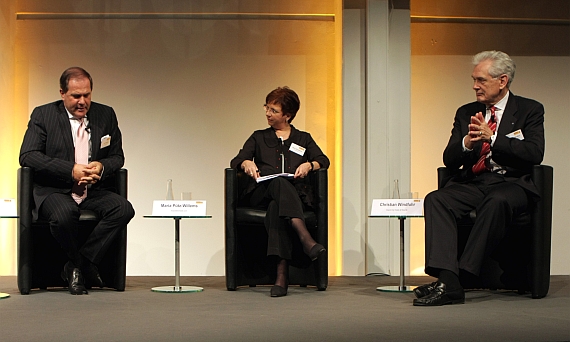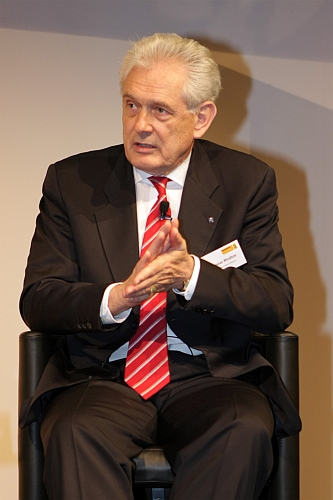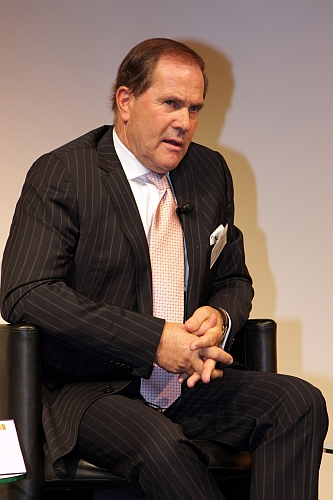ITB-CEO Panel: Kempinski & Grand City, Wittwer & Windfuhr compared
 |
|
| Two managers, two concepts: Does the brand or real estate increase the company''s value? Moderator Maria Puetz-Willems talking to Reto Wittwer, Kempinski Hotels & Resorts (left) and Christian Windfuhr, Grand City Hotels & Resorts during the ITB CEO Panel. |
Berlin (March 18, 2011). The speakers on the CEO panel at the 6th "ITB Hospitality Day" last week couldn''t have been more different. Whilst Reto Wittwer, President and CEO of Kempinski Hotels & Resorts presented his skills as luxury hotel manager with clear emotion, Christian Windfuhr of Grand City explained the strategy of his company - with the core aim of increasing real estate values - with utmost objectivity. Both managers embody the very different approaches of their companies, which in turn reflect the two major models employed today by the hotel sector across the globe. Brand values or real estate investments: Wittwer and Windfuhr gave away some interesting details.
Kempinski owner, the Thai Crowne Property Bureau, is no hotel expert, Reto Wittwer was keen to make clear at the very start of the discussion. The company is a state investment fund, independent of the Thai Royal Family, whose main objective is to increase the wealth of the country. For this reason "the investment in Kempinski 16 years ago was more a coincidence", Wittwer stated coquettishly. Kempinski is the only foreign investment held by the fund. As Wittwer took over the company as CEO in 1995, "it was broke". "In the first two years, I was fully occupied with saving the company from bankruptcy," Wittwer went on.
 |
|
| Christian Windfuhr. |
Kempinski is today, de facto, a pure management company. The Group retains ownership of only one property, the Vier Jahreszeiten in Munich. There are still two lease contracts, one for the Adlon Berlin and one for the Hotel Les Bains St. Moritz. On being questioned by host Maria Puetz-Willems, Editor-in-Chief of hospitalityInside.com, Wittwer put the group''s current value at 600 million EUR. The target is to double this to 1.2 billion EUR by the year 2015.
In case of stress, termination of contract looms
In terms of Kempinski''s income, management fees form the lion''s share. And the CEO has a clear statement here: "If the fee can''t be paid, we have to terminate." But the chemistry between manager and owner must also be right. Over the last two years, he has given up 23 hotels, sometimes also due to "differences with the owner". According to Wittwer, Kempinski generates 1 million EUR net as fees from 100 hotels; EBITDA per year stands at 35%. "That is, I think, very acceptable for our business," Wittwer went on. The fees move in the region of 300,000 EUR to five million EUR.
He resisted vehemently any accusation that Kempinski didn''t want to assume any risk in restricting itself to management contracts. "We employ people and create value. What do bankers do? They charge their fees and do nothing. And lawyers charge their fees whether they win the case or not," Wittwer said defensively.
Grand City: Increasing real estate value
Grand City Hotels pursues quite a different strategy to Kempinski. The hotel group belongs today to the three investors Yakir Gabay, Teddy Saguy and the Weizman family. The declared focus of the company, according to CEO Christian Windfuhr, is clearly on return on investment in respect of the property. "Our strategy is to buy, renovate, refinance and/or retain by way of sale-and-leaseback," he said in Berlin. Up to now, the company has not sold a hotel.
 |
|
| Reto Wittwer. |
Grand City operates hotels both under its own brand as well as under the individual brands of its various franchise partners including Accor, Rezidor, IHG and Best Western. "This variety of brands is part heritage, part strategy," Windfuhr explained. "There are locations which aren''t suitable for any brand." Should an international hotel brand not result in the desired success for a particular hotel, it will continue to be operated without. "With respect to franchise contracts, we expect to increase our net profit. If that doesn''t work, the franchise is quickly removed."
Grand City''s investors do not hire external management companies (like Kempinski, for instance), but retain the operating company for their hotels within their own company and employ managers to this end. According to Windfuhr, this is a "means to an end" in order to increase hotel value.
Certainly, success can be seen. For 2011, Grand City plans revenues of 250 million EUR and GOP of 90 million EUR (adjusted for franchise fees). Grand City finances its hotels from GOP.
The Treugast AA-rating as investment partner also brings the group an increasing number of inquiries from other investors looking to have their hotels operated by the Group. "We also conclude management contracts with third parties. We are perhaps even better managers than the large brands," Windfuhr casually explained. "We think in terms of profit."
Luxury versus pragmatism
Grand City and Kempinski are both proud of their German roots. "We remain, as ever, German. The only Thai restaurant that we have is in our new hotel in Bangkok and is run by Danish staff," Wittwer laughs. Though he does wish that the Germans would be more willing to spend on luxury. "When Germans travel abroad, they have money. When they travel within Germany, their arms seem to lose some of their length and no longer stretch into their pockets," he says.
Windfuhr sees things differently: "We have no desire to expand into the luxury segment, because it''s difficult to maintain luxury. In German cities, luxury doesn''t work," he says. Wittwer, who aims to run his company by German rules, though is focussing expansion outside Germany, is sticking with his exclusive luxury strategy.
|
Since luxury must be limited and the customer should always have the feeling that he is a member of an exclusive club, the "Nuo" brand will also be introduced in Asia alongside Kempinski. In the Middle East and North Africa, Kempinski operates the regional brand "Shaza Hotels".
The "Hermes effect" for Kempinski
That his luxury and brand value strategy is working is illustrated by Wittwer with reference, inter alia, to the increased interest from wealthy investors in contracts with Kempinski. Prospective buyers of the Crillon in Paris have also approached him. "They called us," Wittwer reported in Berlin. Negotiations could go on another two to three months though, until the sale of the Starwood Capital property to the new Saudi Arabian owner is completed.
In the luxury segment, one must have a very long-term strategy, he stressed yet again. Wittwer cited the success of the luxury brand Hermes in the field of ties and laundry. "The Hermes tie is 38 percent more expensive than a tie by Armani or Versace. We want the Hermes effect for Kempinski!" The name Kempinski on the roof "puts 30% on the room rate", he says by way of analogy.
|
Grand City Hotels, currently counts 86 hotels having grown by ten hotels in 2010. According to CEO Christian G. Windfuhr, the company is exactly on schedule. The new hotels include: Grand City Hotel Berlin Mitte, SIR F.K. Savigny Berlin, Best Western Euro-Hotel Berlin, Domus Hotel Berlin, Moevenpick Hotel Stuttgart Airport, Prodomo Hotel Leipzig, Radisson Blu Hotel & Conference Centre Salzburg and the SIR Plantin Hotel Antwerp. First foreign resorts are the E-Hotel Spa & Resort in Cypress and the Golf Hotel Precise Resort El Rompido in Spain. In 2010, six "Mark Hotels" were also integrated into the portfolio and rebranded. Accordingly, the number of hotels operated under the Grand City Hotels brand increased to 35. By 2012, the company hopes to grow to 120 hotels with over 15,000 rooms. |
Windfuhr, meanwhile, is not dreaming of this effect. "We also operate Ibis Hotels, they perhaps don''t generate quite as much individually, but the ratios are very respectable, especially if you have more of them," he went on. Interesting note: Grand City would also be prepared to enter into a strategic alliance, a joint venture or conclude a master franchising deal with or for one of its brands.
Kempinski: The staff challenge
A large challenge facing his company, Wittwer explains, is attracting and training exceptional staff. "Our business depends to 50% on the talent of our staff and to 50% on the owner," he explains. "If our staff aren''t right, the machine doesn''t work." It is the task of the General Manager to select the right candidates. Personnel managers look too closely at CVs, though in this industry is more a matter of personality, and this can''t be seen from a CV. For a number of years, Kempinski has organised large "Career Day" events (see link).
At Grand City, the search for staff is obviously less exciting. "We buy hotels with staff," Windfuhr explained. Grand City has, however, established an Academy for Sales and Revenue Management where those interested can complete a two-year trainee programme.
Windfuhr and Wittwer have seen many a tourism crisis come and go in their time. Only rarely are they foreseeable. Asked about the recent turmoil in North Africa, Wittwer had the following to say: "I''m not a politician, but no-one foresaw the last economic crisis at the World Economic Forum in Davos, and no-one foresaw the political developments in North Africa. Today, no-one can foresee how it will end, whether hotels will be destroyed or not. We should rather focus our attention on our own business." / Susanne Stauss
Feb 25, 2011 Kempinski “Career Day” to surpass 1,000 applicants for the first time
March 18, 2011 Business is back on - Looking back at IHIF and ITB 2011: Top mood with minor dampers
March 18, 2011 Rumours and news from IHIF and ITB
To print this article you have to be registered and logged in for newsletter, visitor or subscription.





